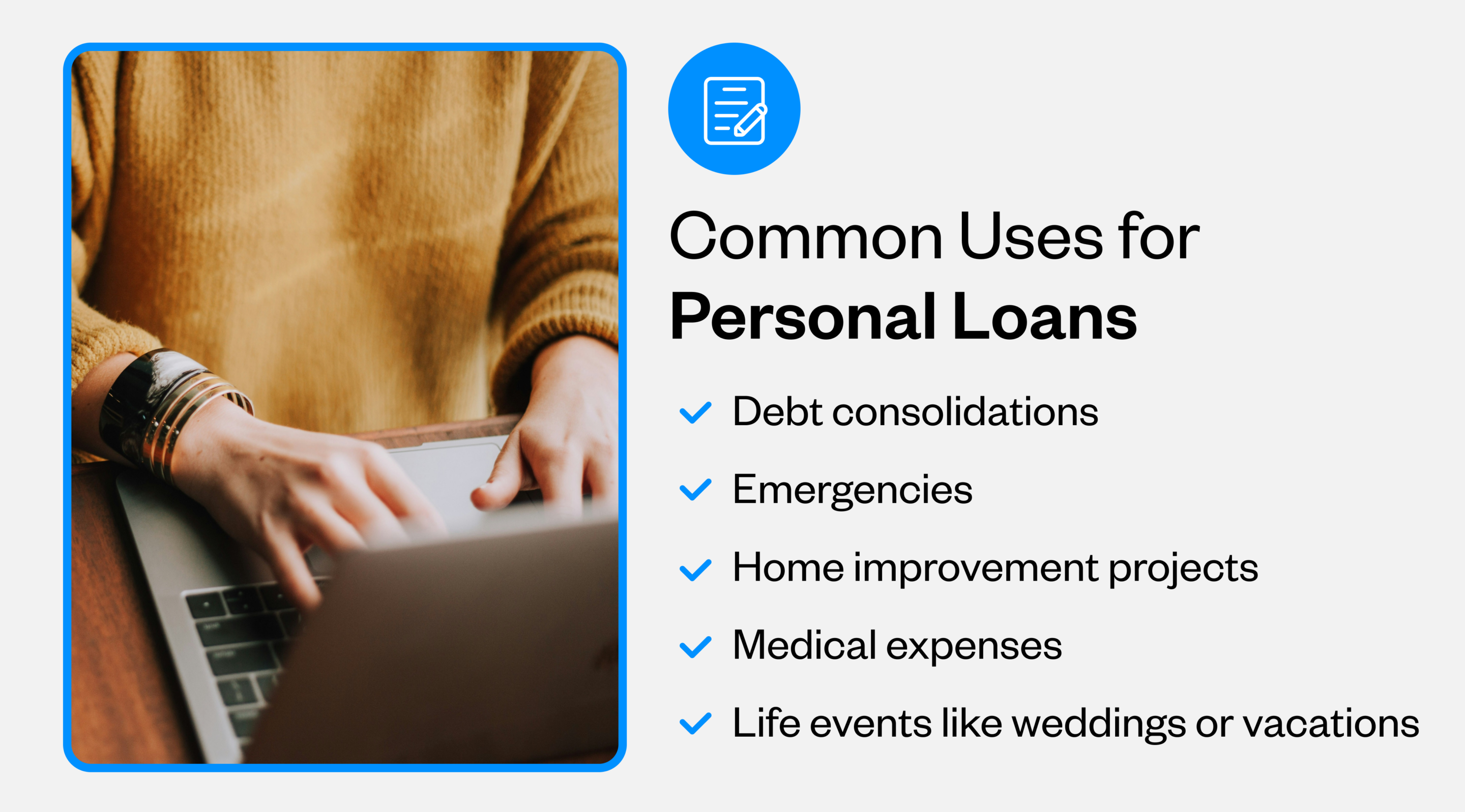

What Is a Personal Loan & How Does It Work?
Discover the Benefits and Flexibility Personal Loans Can Offer
Whether you need help covering medical bills, funding home renovations or consolidating debt, finding a reliable source of financing can make a significant difference. During these times, individuals often consider various financial options to meet their needs, and one popular choice is a personal loan.
What Is a Personal Loan?
A personal loan is a type of loan you can take out from a lender, credit union or bank to borrow money for personal expenses. These loans require you to repay them back in fixed monthly payments over a set period, usually one to seven years. You can use a personal loan for many purposes, like paying off other debts, making home improvements, covering medical bills or making big purchases.
Secured personal loans require you to offer collateral to back the loan. This could be your car, savings account or another asset. Instead, the lender will review your credit report, stability of income and overall qualifications to make the decision.
How Do Personal Loans Work?
Personal loans allow you to borrow money you repay in monthly installments over a set period. Most personal loans are unsecured. Lenders will review your credit report, stability of income and overall qualifications to make the decision.
Once the lender approves your application, they'll provide an offer detailing the amount you can borrow, the interest rate and the repayment terms. If you accept the offer, you can select the most appropriate option to receive the funds. You will then start making monthly payments according to the loan agreement.
What Are the Pros and Cons of Personal Loans?
The benefits of personal loans are:
- Lump sum payment: Getting a lump sum is helpful if you need a significant amount of money quickly for expenses. For instance, you might choose a personal loan instead of refinancing your home loan.
- No collateral required: Most personal loans don't require collateral because they're unsecured
- Fixed interest rates: Fixed interest rates mean you know the cost of accepting the loan upfront
- Flexibility: You can use personal loans for almost any need, from paying off debt to financing a vacation, wedding or renovation
The potential downsides of personal loans include the following:
- Fees and penalties: Personal loans can come with origination fees, prepayment penalties and late payment fees
- Increased debt: If not managed carefully, this debt can lead to financial strain and difficulty meeting repayment obligations.
- Potential impact on credit: While personal loans can help build good credit if managed properly, too much unsecured debt can significantly lower your credit score
- Eligibility requirements: A low credit score can make qualifying for a personal loan impossible
What Can You Use a Personal Loan For?
Personal loans provide the flexibility to manage both planned and unexpected expenses, making them a valuable option for many individuals.

- Debt consolidation: Combining credit card balances, payday loans and other debts into one loan can lower your overall interest rate and simplify your financial obligations
- Emergencies: A personal loan gives you quick access to funds needed to address emergencies, helping you cover costs without disrupting your budget
- Home improvement projects: A personal loan offers a way to finance these projects, allowing you to enhance your living space and potentially increase your home's value
- Medical expenses: Personal loans can help cover the costs of surgeries, treatments or other medical needs that aren't fully covered by insurance
- Life events like weddings or vacations: Life events such as weddings, vacations or other significant celebrations often come with hefty price tags
How Do You Get a Personal Loan?
Getting a personal loan is a pretty straightforward process, but it's important to take a few steps to ensure you're getting the best deal and can manage the repayments. Here's how to get a personal loan:
- Assess your finances: Figure out how much you can comfortably borrow and repay each month
- Research lenders: Reach out to banks, credit unions and online lenders to see their offers. Look at factors like interest rates, fees and how long you have to pay the loan back.
- Apply: The lender will review your loan application, verify the information you provided and run a credit check to see if you qualify
What Are the Features of a Personal Loan?
Personal loans come with several key features that borrowers should understand before taking one out. These features can affect the overall cost and terms of the loan, as well as the borrower's financial obligations.
- Origination fee: The origination fee covers the costs associated with processing your loan application
- Collateral requirements: Unlike secured loans, which require collateral like a house or car, most personal loans are unsecured
- Fixed monthly payments: With fixed monthly payments, you pay the same amount every month until the loan is fully repaid
- Repayment terms: Repayment terms for personal loans vary. Shorter terms usually have lower overall interest costs but higher monthly payments. On the other hand, longer terms have lower monthly payments but higher total interest costs.
Wrapping Up: Understanding Personal Loans
Personal loans offer flexibility whether you're paying off debt, handling unexpected expenses or making a big purchase. If you're looking for a personal loan, consider California Credit Union. We offer competitive rates, flexible terms and personal financial counseling to help you make the best financial decisions.
Ready to take the next step? Explore our personal loan options at California Credit Union and find the perfect solution for your financial needs.
Terms and Conditions
All loans subject to approval. Rates, terms and conditions are subject to change. Fees and charges may apply.





